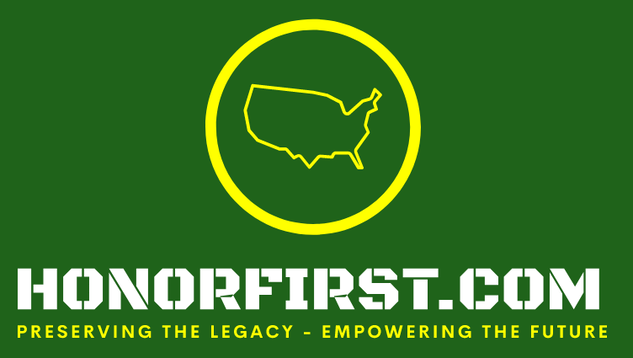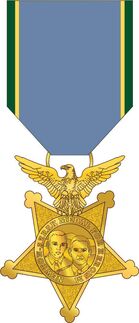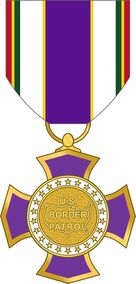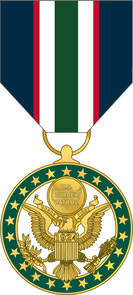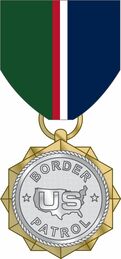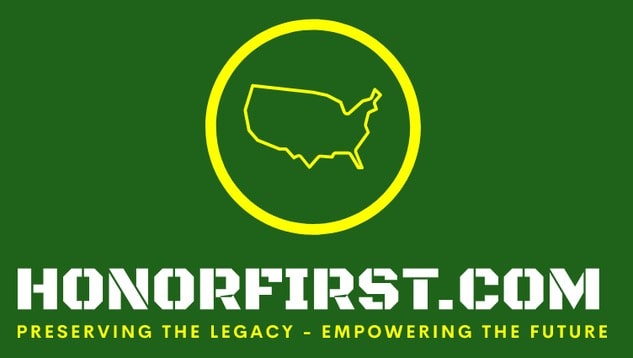U.S. Border Patrol Honorary Awards
Help spread the word!
On August 8, 2002, the Border Patrol launched its awards and medals program, with Chief Gustavo De La Viña bestowing the inaugural two medals at the Chief's Conference in Swanton Sector, Vermont. Chief Patrol Agent Paul E. Conover received the Purple Cross Medal for injuries sustained during a 1982 gunfight with a murder suspect in Redford, Texas. Deputy Chief Patrol Agent Charles C. Whitmire earned the Chief's Commendation Medal (later repurposed as the USBP Achievement Medal) for his outstanding performance during the 2002 Winter Olympics' security operations in Salt Lake City, Utah.
Assistant Chief William V. Beaumet, in collaboration with the U.S. Army's Institute of Heraldry, originally developed the awards program, including designing the medals and ribbons. Upon transferring to the Border Patrol Academy in Glynco, Georgia, the program was passed on to Assistant Chief Randy Gallegos, who continued the procurement of the initial medals. In June 2002, Assistant Chief Dan Harris took over the program.
In August 2002, Deputy Chief Patrol Agent Beaumet was asked to design certificates to accompany the first two awards, completing them just in time for the Chief's Conference.
Despite the creation and proposal of numerous awards, many were never implemented. By 2004, the Chief's Commendation Medal had been awarded only once and subsequently fell into disuse. The Newton-Azrak Award and Purple Cross Medal sets were the only distinctions consistently presented to employees.
Assistant Chief William V. Beaumet, in collaboration with the U.S. Army's Institute of Heraldry, originally developed the awards program, including designing the medals and ribbons. Upon transferring to the Border Patrol Academy in Glynco, Georgia, the program was passed on to Assistant Chief Randy Gallegos, who continued the procurement of the initial medals. In June 2002, Assistant Chief Dan Harris took over the program.
In August 2002, Deputy Chief Patrol Agent Beaumet was asked to design certificates to accompany the first two awards, completing them just in time for the Chief's Conference.
Despite the creation and proposal of numerous awards, many were never implemented. By 2004, the Chief's Commendation Medal had been awarded only once and subsequently fell into disuse. The Newton-Azrak Award and Purple Cross Medal sets were the only distinctions consistently presented to employees.
See the files below for the early proposals:
In 2018, U.S. Border Patrol Headquarters recognized the importance of enhancing employee recognition. Assistant Chief Clifford Gill expanded upon the groundwork laid by Chief Beaumet by developing the policy for the USBP Honorary Awards Program. This program reauthorized the USBP 75th Anniversary Award for wear and repurposed two previously designed awards from the U.S. Army Institute of Heraldry for use within the agency.
All USBP Honorary Awards were authorized for wear as per the 2019 Interim Wear Guidance for USBP Honorary Awards.
In 2021, the USBP updated its Uniform Policy and incorporated the 2019 guidance. Furthermore, on April 23, 2024, the USBP issued updated interim guidance for wearing Authorized Devices and USBP Honorary Awards.
On April 23, 2023, the U.S. Border Patrol superseded the original IOP and incorporated the updated Purple Cross criteria into the 2023 USBP Honorary Awards and Recognitions Program IOP.
- 2018 USBP Honorary Awards and Recognitions IOP
- 2018 Honorary Award Narrative Guidance
- Updated Purple Cross Criteria
All USBP Honorary Awards were authorized for wear as per the 2019 Interim Wear Guidance for USBP Honorary Awards.
In 2021, the USBP updated its Uniform Policy and incorporated the 2019 guidance. Furthermore, on April 23, 2024, the USBP issued updated interim guidance for wearing Authorized Devices and USBP Honorary Awards.
On April 23, 2023, the U.S. Border Patrol superseded the original IOP and incorporated the updated Purple Cross criteria into the 2023 USBP Honorary Awards and Recognitions Program IOP.

Recognizing the achievements, service and heroism of employees is important. It is critical for those in positions of leadership to value the workforce. Awards are a fundamental manner for leaders to demonstrate appreciation to the workforce for upholding the organizational values.
USBP Honorary Awards overview
- |
Newton-Azrak Award |
USBP Commendation Award |
USBP Achievement Award |
Purple Cross |
Purpose |
Recognizes conspicuous heroism beyond the call of duty by USBP employees, open for continuous individual and team nominations. |
For teams and individuals to recognize:
|
For teams and individuals to recognize:
|
To commemorate significant injuries and assault related wounds suffered in the scope of duty. |
Tier |
1st tier for valor |
|
|
Assault related injuries distinguished with a "V" device. |
Awarded by |
Chief, U.S. Border Patrol |
Chief, U.S. Border Patrol |
Chief Patrol Agents or HQ directorate heads |
Chief, U.S. Border Patrol |
Newton-Azrak Award
The Border Patrol's highest honor is the Newton-Azrak Award. The award is named for Border Patrol Inspectors Theodore Newton and George Azrak, who were murdered by two drug smugglers in San Diego County in 1967. See this link for the full story of their sacrifice.
Newton-Azrak Award graphic by the Army Institute of Heraldry (TIOH). TIOH spec sheets for the award.
Criteria
May be awarded to any USBP employee who performs a conspicuous act of heroism:
See this link for a history of the award and a list of its recipients.
Newton-Azrak Award graphic by the Army Institute of Heraldry (TIOH). TIOH spec sheets for the award.
Criteria
May be awarded to any USBP employee who performs a conspicuous act of heroism:
- The act performed must be above and beyond the call of duty.
- The act performed must present an imminent and personal danger to the life of the individual.
- The individual must have knowledge of the risks involved and voluntarily assume them.
See this link for a history of the award and a list of its recipients.
USBP Purple Cross
This is the U.S. Border Patrol wound award. It may be used to commemorate injuries suffered in the scope of duty as well as injures due to assault related events.
USBP Purple Cross graphic by TIOH. TIOH spec sheets for the award.
Criteria
May be awarded to any employee who, while in the scope of duty, sustains:
See this link for a list of some of its recipients.
USBP Purple Cross graphic by TIOH. TIOH spec sheets for the award.
Criteria
May be awarded to any employee who, while in the scope of duty, sustains:
- Protracted or permanent impairment of any bodily function;
- Fatal injury;
- Injury as the result of an assault with a deadly weapon, which requires treatment by a medical professional; or
- Injuries attributed, directly or indirectly, from an attack by an assailant with the following factors:
- The injury or wound cannot be attributed to bravado or gross negligence; and
- Any act of valor may be distinguished with the addition of a "V" device to affix to the ribbon.
See this link for a list of some of its recipients.
USBP Commendation Award
Originally designed to be the USBP Distinguished Career Service Award under the Immigration and Naturalization Service (INS), the designed was repurposed as the USBP Commendation Award. Although the USBP Distinguished Career Service Award existed in the INS, the medal set was never authorized or issued. Any of the USBP Distinguished Career Service Awards in existence were created as prototypes and never presented to a recipient.
Design
TIOH began with the obverse of the Great Seal of the United States. The field of 13 stars were replaced with the USBP patch. The USBP motto, "Honor First" was placed on the ribbon between the wings and the USBP patch. The USBP's year of inception, "1924", was placed on the shield. The 22 stars represent the 21 sectors that existed at the time the award was designed plus the USBP Academy.
USBP Commendation Award graphic by TIOH. TIOH spec sheets for the award.
Criteria
Awarded to an employee or a group for exceptional meritorious achievement or service. The acts or services must be accomplished or performed in a manner above that normally expected, and sufficient to distinguish the recipient(s) above those performing similar services, or
See this link for a list of some of its recipients.
Design
TIOH began with the obverse of the Great Seal of the United States. The field of 13 stars were replaced with the USBP patch. The USBP motto, "Honor First" was placed on the ribbon between the wings and the USBP patch. The USBP's year of inception, "1924", was placed on the shield. The 22 stars represent the 21 sectors that existed at the time the award was designed plus the USBP Academy.
USBP Commendation Award graphic by TIOH. TIOH spec sheets for the award.
Criteria
Awarded to an employee or a group for exceptional meritorious achievement or service. The acts or services must be accomplished or performed in a manner above that normally expected, and sufficient to distinguish the recipient(s) above those performing similar services, or
- Awarded to an individual or a group for extraordinary lifesavings efforts not involving heroism,
- Awarded to an individual for extraordinary heroism, not justifying the Newton-Azrak Award, or
- Awarded to a group for extraordinary heroism.
See this link for a list of some of its recipients.
USBP Achievement Award
Originally designed to be the Chief's Commendation Medal under the Immigration and Naturalization Service, the design was repurposed as the USBP Achievement Award. The Chief's Commendation Medal was awarded to one person in 2002.
Criteria
Awarded to an employee or a group for meritorious achievement or service based on sustained performance or specific achievement of a superlative nature, and shall be of such merit as to warrant more recognition than is possible by non-traditional awards, but which is not significant enough to justify the U.S. Border Patrol Commendation Award, or
USBP Achievement Award graphic by TIOH. TIOH spec sheets for the award.
See this link for a list of some of its recipients.
Criteria
Awarded to an employee or a group for meritorious achievement or service based on sustained performance or specific achievement of a superlative nature, and shall be of such merit as to warrant more recognition than is possible by non-traditional awards, but which is not significant enough to justify the U.S. Border Patrol Commendation Award, or
- Awarded to an individual or a group for lifesavings efforts, exceeding expectation, not involving heroism,
- Awarded to an individual or a group for heroism, not justifying the U.S. Border Patrol Commendation Award.
USBP Achievement Award graphic by TIOH. TIOH spec sheets for the award.
See this link for a list of some of its recipients.
USBP 75th Anniversary Medal
Criteria
TIOH spec sheets for the award.
- Awarded to every Border Patrol Agent and Aircraft Pilot serving on and immediately before May 28,1999.
- Agents hired after May 28, 1999 shall not be eligible to receive the award.
- Border Patrol Agents attending the Academy on May 28, 1999, shall be eligible to receive the award upon graduation.
TIOH spec sheets for the award.
HonorFirst note: Many USBP professional staff (non-agent) employees feel undervalued compared to their agent counterparts, often perceiving themselves as less important within the organization. The criteria for the 75th Anniversary Medal has amplified this sentiment. Fortunately, the USBP has taken a positive step by making all employees eligible for the Centennial Medal. A further step to foster inclusivity and appreciation could be the retroactive awarding of the 75th Anniversary Medal to all USBP employees serving on and immediately before May 28, 1999.
USBP Centennial Medal
Criteria
TIOH graphics and spec sheets for the award.
Symbolism
- Awarded to every USBP employee serving on and immediately before May 28, 2024.
- Employees hired after May 28, 2024, shall not be eligible to receive the award.
- Border Patrol Agents attending the Academy on May 28, 2024, shall be eligible to receive the award upon graduation.
TIOH graphics and spec sheets for the award.
Symbolism
- Medal. Gold denotes honor. The laurel wreaths symbolize achievement. The 22 stars and rays represent the sectors composing the Border Patrol. The continental United States celebrates the hundred years of service provided by the agents who safeguard the borders of the nation.
- Ribbon. Blue represents the Atlantic and Pacific Oceans. Gold symbolizes the border of the United States. Green signifies land. Black and White honors past and current achievements of the agents and officers.
Relationship of USBP Honorary Awards to other Recognitions
The USBP Honorary Awards are designed to displace non-traditional awards as the recognition item for lessor yet worthy achievements, service and heroism. Further, the intent for USBP Achievement Award is for the decoration to be given generously, to be presented to approximately 10% of the workforce per year.
Actions recognized by the Newton-Azrak Award, Purple Cross Award and U.S. Border Patrol Commendation Medal are to be the primary source of USBP nominees for all exterior awards:
Most exterior awards systems recognize less than 10% of the nominations (90% failure to recognize). By recognizing a Border Patrol employee with an USBP Honorary Award first, it is ensured that the employee action is recognized and that the recognition is given by the their organization, the U.S. Border Patrol.
Recipients of significant governmental and non-governmental recognitions may be awarded USBP Honorary Awards.
Purpose
Criteria
Nominations to receive a USBP Honorary Award for significant governmental and non-governmental recognitions will be based on the following criteria:
Actions recognized by the Newton-Azrak Award, Purple Cross Award and U.S. Border Patrol Commendation Medal are to be the primary source of USBP nominees for all exterior awards:
- DHS Secretary’s Awards
- Annual Commissioner’s Awards
- Department of Justice, Public Safety Officer Medal of Valor
- Congressional Medal of Bravery
- Other similar recognitions
Most exterior awards systems recognize less than 10% of the nominations (90% failure to recognize). By recognizing a Border Patrol employee with an USBP Honorary Award first, it is ensured that the employee action is recognized and that the recognition is given by the their organization, the U.S. Border Patrol.
Recipients of significant governmental and non-governmental recognitions may be awarded USBP Honorary Awards.
Purpose
- Provides the recipient with a recognition item authorized for wear.
- Enables the recognition of employees for worthy actions occurring before the implementation of the USBP Honorary Award Program.
- Communicates to non-recipient employees that the Border Patrol values the actions of its workforce.
- Communicates to non-recipient employees that workforce actions are valued.
- Appropriately addresses equity and expectancy perceptions.
Criteria
Nominations to receive a USBP Honorary Award for significant governmental and non-governmental recognitions will be based on the following criteria:
- Only current USBP employees are eligible.
- The event must have occurred while the employee was employed by CBP, the USBP or a legacy CBP organization.
- The nomination must be based on convincing information to establish the veracity of the claim.
USBP Honorary Awards Conversion Chart
Past Award Received* |
Converts to USBP Honorary Award |
Congressional Medal of Bravery |
U.S. Border Patrol Commendation Medal with “V” Device |
DOJ Public Safety Officer Medal of Valor |
U.S. Border Patrol Commendation Medal with “V” Device |
DHS Secretary’s Valor Award |
U.S. Border Patrol Commendation Medal with “V” Device |
CBP Medal of Honor for Heroism |
U.S. Border Patrol Commendation Medal with “V” Device |
CBP Meritorious Service Award for Valor |
U.S. Border Patrol Commendation Medal with “V” Device |
DHS Secretary’s Awards, including but not limited to:
|
U.S. Border Patrol Commendation Medal |
Commissioner’s Annual Awards, including but not limited to:
|
U.S. Border Patrol Commendation Medal |
Commissioner’s Humanitarian Award |
U.S. Border Patrol Achievement Medal with “V” Device |
Commissioner’s Blue Eagle Award |
U.S. Border Patrol Achievement Medal |
Commissioner’s Unit Citation Award |
U.S. Border Patrol Achievement Medal |
* The USBP Awards Coordinator should be contacted for information concerning the conversion of any awards not listed.
Distinguishing of Past Acts of Under-Recognized or Unrecognized Heroism, Injuries or Wounds
Purpose
Criteria
USBP Honorary Awards are available to distinguish past acts of under-recognized or unrecognized heroism, injuries or wounds based on the following criteria:
- Authorizes the consideration of all past acts of under-recognized or unrecognized heroism, injuries or wounds within an employee’s USBP career.
- Provides the employee with a recognition item authorized for wear.
- Provides a tangible representation to the recipient that their action is appreciated and worthy of recognition.
- Affirms to the recipient that their actions were acceptable and correct.
- Communicates to non-recipient employees that workforce actions are valued.
- Appropriately addresses equity and expectancy perceptions.
Criteria
USBP Honorary Awards are available to distinguish past acts of under-recognized or unrecognized heroism, injuries or wounds based on the following criteria:
- Only current USBP employees are eligible.
- The event must have occurred while the employee was employed by the USBP.
- The nomination must be based on convincing information to establish the veracity of the claim.
USBP Honorary Award Guidance Tables
This guidance was not incorporated in the 2023 USBP Honorary Awards and Recognitions IOP update.
It is provided here for reference and to preserve historical context.
It is provided here for reference and to preserve historical context.
The tables are to be used as guidelines to assist in identifying appropriate employee recognitions based on the type of accomplishment:
If more than one table may be used to evaluate an employee's accomplishment, the table most advantageous to the employee should be used.
The guidance tables do not address all worthy acts or categories of achievement. Honorary Awards may be used to recognize employee achievements for a tour of duty, retirement or other commendable situations.
- Table #1 – Administrative accomplishments
- Table #2 – Acts of heroism and valor
- Table #3 – Law enforcement actions
- Table #4 – Lifesaving actions
If more than one table may be used to evaluate an employee's accomplishment, the table most advantageous to the employee should be used.
The guidance tables do not address all worthy acts or categories of achievement. Honorary Awards may be used to recognize employee achievements for a tour of duty, retirement or other commendable situations.
Table #1 - ADMINISTRATIVE DUTIES AWARD GUIDANCE
This table is used to determine the appropriate award for an employee performing administrative functions. A simple matrix evaluating the value of the achievement/accomplishment to the extent of the application identifies the award to which the employee should be nominated. For example, an employee that creates a "substantial" change to a program that impacts a sector (extended), should be nominated for a USBP Achievement Award.
- |
LIMITED Affects functions, mission, or personnel of one station or the equivalent. |
EXTENDED Affects functions, mission, or personnel of one sector or the equivalent. |
BROAD Affects functions, mission, or personnel of three or more sectors or the equivalent. |
MODERATE Change or modification of an operating principle or procedure with limited use impact. |
Non-traditional Award |
Non-traditional Award |
USBP Achievement Award |
SUBSTANTIAL Substantial change or modification of procedures. An important improvement to the value of a product, activity, program, or service. |
Non-traditional Award |
USBP Achievement Award |
USBP Commendation Award |
EXCEPTIONAL Initiation of a new principle or major procedure: a superior improvement to the quality of a critical product, activity, program, or service. |
USBP Achievement Award |
USBP Commendation Award |
USBP Commendation Award |
Table #2 - HEROIC AND VALOROUS ACT AWARD GUIDANCE
This table is used to determine the appropriate award for an employee who faced danger while in the scope of duty. The nominator would determine the level of danger an employee faced and gauge the employee's level of performance during the action. For example, an employee who faced "great danger" while performing "beyond the call of duty" should be nominated for a USBP Commendation Award with "V" Device.
Lifesavings actions not involving danger to the employee are recognized under Table #4. Such actions are NOT acts of heroism/valor. Employees must face danger to receive a valor award. See the definitions near the bottom of this page.
Lifesavings actions not involving danger to the employee are recognized under Table #4. Such actions are NOT acts of heroism/valor. Employees must face danger to receive a valor award. See the definitions near the bottom of this page.
- |
EXPECTED |
EXCEEDED EXPECTATION |
BEYOND THE CALL OF DUTY |
DANGER Employee faces personal risk of bodily harm during the action. |
Non-traditional Award |
Non-traditional Award |
USBP Achievement Award with "V" Device |
GREAT DANGER Employee faces personal risk of great bodily harm during the action. |
Non-traditional Award |
USBP Achievement Award with "V" Device |
USBP Commendation Award with "V" Device |
GRAVE DANGER Employee’s life is placed in peril of death or s/he faces serious bodily harm during the action. |
USBP Achievement Award with "V" Device |
USBP Commendation Award with "V" Device |
Newton-Azrak Award |
Table #3 - LAW ENFORCEMENT ACTION AWARD GUIDANCE
This table was developed to provide a means to recognized employees for performing their primary function. Recognitions under this table should be presented in greater numbers than any of the other tables.
In utilizing this table, the nominator would determine the intersection of the employee's actions. For example, an employee making an "exceptional" "misdemeanor" arrest/seizure should be nominated for the USBP Achievement Award.
In utilizing this table, the nominator would determine the intersection of the employee's actions. For example, an employee making an "exceptional" "misdemeanor" arrest/seizure should be nominated for the USBP Achievement Award.
- |
ADMINISTRATIVE |
MISDEMEANOR |
FELONY |
ROUTINE Routine enforcement actions and seizure amounts |
No award |
No award |
Non-traditional Award |
SUBSTANTIAL Substantial enforcement actions and seizure amounts |
Non-traditional Award |
USBP Achievement Award |
USBP Achievement Award |
EXCEPTIONAL Exceptional enforcement actions and seizure amounts |
Non-traditional Award |
USBP Achievement Award |
USBP Commendation Award |
Table #4 - LIFESAVING ACTION AWARD GUIDANCE
An employee’s performance during a lifesavings act is the primary measure to identify the proper award.
Lifesaving actions under this table do not involve danger to the employee. If danger is present, then the action should be considered heroic/valorous and Table #2 used to evaluate the appropriate recognition.
Lifesaving actions under this table do not involve danger to the employee. If danger is present, then the action should be considered heroic/valorous and Table #2 used to evaluate the appropriate recognition.
EXPECTED |
EXCEEDED EXPECTATION |
EXTRAORDINARY |
Non-traditional Award |
USBP Achievement Award |
USBP Commendation Award |
Definitions
Danger - Employee faces personal risk of bodily harm during the action.
Great Danger - Employee faces personal risk of great bodily harm during the action.
Grave Danger - Employee’s life is placed in peril of death or s/he faces serious bodily harm during the action.
Beyond the call of duty – A voluntary course of action taken in the scope of duty while facing actual or potential danger, the omission of which would not justly subject the employee to censure for failure to meet expectation. The action usually includes the acceptance of existing danger or extraordinary responsibilities.
Heroism / Valor – The minimum measure of bravery, gallantry or courage by which an employee may be recognized with the U.S. Border Patrol Achievement Award with a “V” device. Heroism is determined based on the level of actual or potential physical risk the employee faced in relation to their level of performance while in the scope of duty. Responding in the face of perceived danger does not qualify as heroism / valor.
Extraordinary Heroism / Valor - The minimum measure of bravery, gallantry or courage by which an employee may be recognized with the U.S. Border Patrol Commendation Award with a “V” device. Extraordinary heroism is determined based on the level of actual or potential physical risk the employee faced in relation to their level of performance while in the scope of duty. Responding in the face of perceived danger does not qualify as heroism / valor.
Conspicuous Heroism / Valor - The measure of bravery, gallantry or courage by which an employee may be recognized with the Newton-Azrak Award. Conspicuous heroism is an action taken by an employee while facing grave danger, performing above the call of duty and in the scope of duty.
Line of Duty - Any action that an employee is obligated or authorized by law, rule, regulation, or written condition of employment to perform or for which the employee is compensated by U.S. Customs and Border Protection.
Great Danger - Employee faces personal risk of great bodily harm during the action.
Grave Danger - Employee’s life is placed in peril of death or s/he faces serious bodily harm during the action.
Beyond the call of duty – A voluntary course of action taken in the scope of duty while facing actual or potential danger, the omission of which would not justly subject the employee to censure for failure to meet expectation. The action usually includes the acceptance of existing danger or extraordinary responsibilities.
Heroism / Valor – The minimum measure of bravery, gallantry or courage by which an employee may be recognized with the U.S. Border Patrol Achievement Award with a “V” device. Heroism is determined based on the level of actual or potential physical risk the employee faced in relation to their level of performance while in the scope of duty. Responding in the face of perceived danger does not qualify as heroism / valor.
Extraordinary Heroism / Valor - The minimum measure of bravery, gallantry or courage by which an employee may be recognized with the U.S. Border Patrol Commendation Award with a “V” device. Extraordinary heroism is determined based on the level of actual or potential physical risk the employee faced in relation to their level of performance while in the scope of duty. Responding in the face of perceived danger does not qualify as heroism / valor.
Conspicuous Heroism / Valor - The measure of bravery, gallantry or courage by which an employee may be recognized with the Newton-Azrak Award. Conspicuous heroism is an action taken by an employee while facing grave danger, performing above the call of duty and in the scope of duty.
Line of Duty - Any action that an employee is obligated or authorized by law, rule, regulation, or written condition of employment to perform or for which the employee is compensated by U.S. Customs and Border Protection.
